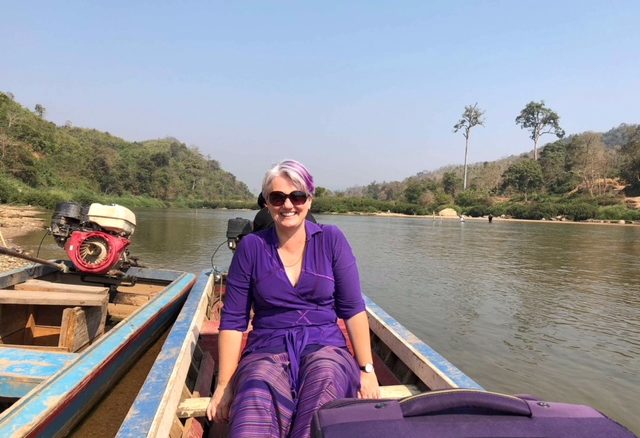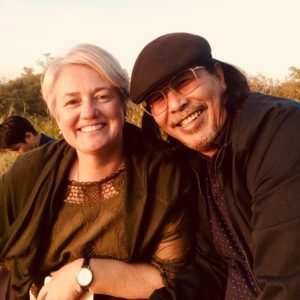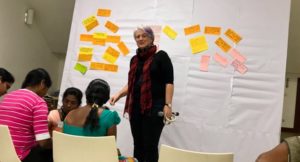
Like the late, great US evangelist Dr Martin Luther King, Australia’s Emma Leslie has a dream. For her, it is world peace.
Not unusual, you might say. Who doesn’t yearn for such an outcome?
But Emma is different. She doesn’t just wish it would happen, but lives, breathes and works tirelessly to try and achieve her dream.
Her personal world peace journey was sparked at her family home in Bathurst as a young girl and has taken her through war-ravaged lands where suffering was everywhere and the need for peace at its starkest.
An eight-year-old Emma was watching TV news footage of what had become commonly known in Australia as the ‘starving Kampucheans’ – the starving citizens of Cambodia walking almost like skeletons away from Khmer Rouge cruelty.
“I remember sitting up at the dinner table that night and wondering why I was so lucky to have food, and they didn’t,” she said.
How fitting then, that those images of death, starvation and destruction in Cambodia back then, have led her and her husband Ngarm, also a Cambodian peace worker, to create and operate the Centre for Peace & Conflict Studies, in Siem Reap.

Emma, who has now lived in Cambodia for 20 years, said she thought peace was possible through political will, leadership and the momentum of many people to support the efforts for peace.
“This means that when government or political leaders really put their minds to making peace, especially with the pressure of their people, good things can happen,” she said on a flying visit to Australia in April, as guest speaker at the Rotary Conference: Making a Difference through Peace and International Understanding.
“We can see that today in South Korea. President Moon came to office saying he will make new policies and approach North Korea. He mobilised the USA and China to support him, and Kim Jong Un responded positively.
“Our role at the Peace Centre is to support those kinds of efforts. A leader at the top deciding to make peace is not enough.
“Peace processes are hard and those engaged need technical advice, training, encouragement, comparative experiences, networking and ideas. We have done that kind of work with both government and non- state actors (armed groups) in the Philippines, Myanmar, Thailand and Cambodia.”
Emma, who was awarded an Order of Australia (AM) in 2016, and holds a Bachelor Degree in Politics and History from Australian National University, Canberra, and a Graduate Diploma in Secondary Education and Honorary Doctorate of Education at Charles Sturt University, said the Peace Centre provided deeper analysis and reflection on what was causing conflict and what might be ways it can be addressed, sharing this in print, online and through videos.

She said the Peace Centre also helped to change what she described as “dominant narratives”.
“A few weeks ago my eight-year- old nephew Charlie said he had learned at school that North Korea was going to bomb Australia and he was afraid,” she said.
“We should not teach kids fear. This narrative comes from a media frenzy which does not analyse and try to understand, and a school system which buys into that frenzy.
“So consequently we build a generation of kids who are taught to be afraid of the world, not to take critical and constructive leadership into it. “This is why we are building the Cambodia Peace Museum in Battambang, so Khmer kids can know more than the Khmer Rouge genocide story, but also celebrate the peace that was built in 1991, and understand the resilience Cambodians showed in rebuilding their country over the past 25 years.
“Today Cambodia sends peacekeepers to other countries which is a remarkable contribution given their history,” she said, adding the Peace Centre would soon make a video series of everyday lives of North Koreans and their aspirations for peace.
She said they were also doing similar work now in Myanmar on the situation of Rohingyas, trying to more deeply understand the complex dynamics and engage those who have been involved in order to find a longer term solution.
“The plight of Rohingya has been for many decades already and we need to find a way to address the root causes of this conflict,” she said.
“I love this work. It genuinely makes me happy. I think in this modern age, war is basically an unacceptable response to complex problems and with leadership and people working together, despite the massive challenges, can be averted.
“I get to work with remarkable, committed and mindful people. I feel really blessed by my 20 years living in Cambodia, and working across the region.”
After years of study and working with the Anglican Board of Mission in Development Education and the National Council of Churches Solidarity Program here in Australia, Emma’s quest for a lasting world peace began in earnest when, as a young woman in her early 20’s, she started working for the Christian Conference of Asia Youth Committee, which worked on social justice around the region.
She first went to Cambodia under a World Council of Churches two year internship which required living simply like local people and working on cutting edge issues.
“I worked with the Cambodia Campaign to ban Landmines, addressing land issues after demining had taken places,” she said.
“I was visiting a water project in Sri Lanka which kept getting blown up because of the war,” she said.
“Then I realized there could be no development unless there was peace. I decided to work for peace,” she said.
Asked from whom she thought she gained her zest for peace and compassion Emma said that along the way many had mentored and shaped her passion for peace work.
“My first boss Robert Cooper taught me a lot about development work and working with partners around the world in an equitable way,” she said.
“My grandfather Bishop Ken Leslie modeled what a life of service can look like. My late friend Dekha Abdi, from Kenya, shaped my understanding of the cost of working for peace and how strategic and pragmatic it needs to be and my family gave me a good foundation for this work in their values of hospitality, caring for others and Living a committed life.”
SheSociety is a site for the women of Australia to share our stories, our experiences, shared learnings and opportunities to connect.

Leave a Reply